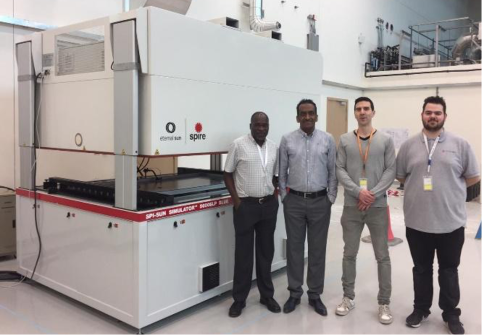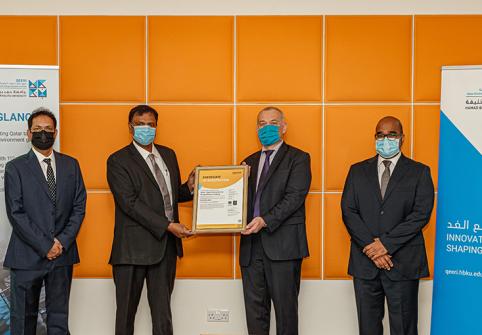Innovation HBKU’s Qatar Environment and Energy Research Institute a Growing Force in Solar Technology Research
Solar Consortium’s groundbreaking work supported by cutting-edge outdoor test and photovoltaic facilities
Since its launch in 2018, the Solar Consortium initiated by Qatar Environment and Energy Research Institute (QEERI) at Hamad Bin Khalifa University (HBKU) has become a global leader in the research and development on solar technologies optimized for desert climates.
The Solar Consortium, currently composed of seven members, takes advantage of QEERI’s world-class solar testing facilities and expertise, including its Outdoor Test Facility (OTF) and recently opened Photovoltaic (PV) Reliability Lab. The OTF is a 35,000 m2 field station with state-of-the-art solar technologies and systems allowing the optimization of PV performance in harsh climates and the development of solutions to mitigate solar conversion degradation over time due to outdoor exposure. The PV Reliability Lab’s equipment and tools, including environmental chambers, enables precise module testing and simulation of outdoor degradation conditions, which complements field results and contributes to the development of ad hoc solutions for Qatar and the region. Members of the Solar Consortium carry out shared (pre-competitive) and private (competitive) research projects in the fields of soiling mitigation, PV modules cleaning, PV production forecasting, and others.
As part of the Consortium’s work to increase the PV energy yield in desert conditions, over 25 different PV module technologies have been tested in the OTF. As a result of growing international interest in PV power plants for the MENA region, the Consortium has a particular interest in bifacial PV modules. Bifacial PV is capable of producing energy from both its front and back sides, taking advantage of the high reflectivity of Qatar’s ground (albedo). Measurements at QEERI’s OTF have established that albedo from Qatar’s ground is over 40%, which can boost electricity production with bifacial PV. Accordingly, research undertaken by QEERI’s OTF and Solar Consortium contributes to a better understanding of boundary conditions leading to the optimization of technologies used, as well as system configuration for improved economics and business models for PV power plants in Qatar, as well as in similar environments.
As well as underpinning the Solar Consortium, QEERI’s facilities support the planning and implementation of Qatar’s Siraj solar energy project. Bifacial modules have been proposed for Qatar’s 350 MW Siraj-1 PV power plant, together with such trackers, which are becoming frequently used for large PV plants that still need to find optimal ways to arrange installed trackers and modules. In this sense, data from the Solar Consortium tracker research project will be especially useful for ongoing PV development in Qatar.
Dr. Veronica Bermudez, Senior Research Director of QEERI's Energy Center, said: “Our aim with the Solar Consortium is to bring together researchers, technology producers, project developers and local authorities from the solar energy field, to shape a common focus on practical tests of solar-based devices and systems within Qatar’s desert environment. We are thrilled at how the industry has involved us in their development projects and look forward to building upon these partnerships. Building a solid understanding of the reliability and degradation pathways is a key component for the future economic competitiveness of solar technologies, in particular for Qatar and the MENA region.”
QEERI also provides meteorological, soiling and PV performance data to Siraj partners. In the future, QEERI’s facilities might also support the testing and qualification of PV modules supplied for the project. These include soiling and dust accumulation, one of the biggest challenges facing PV power plants in Qatar and the region. To cope with soiling, many PV plants in the Middle East are starting to test or use robotic cleaning machines. A key question is whether such machines abrade the anti-reflective coatings on PV modules thereby potentially degrading their performance. Additional concerns include the optimal schedule for running the machines. In response, the Solar Consortium has launched a research project at the OTF using real-world modules, cleaning machines and operating conditions. The project will be one of the most realistic and decisive studies to date on these questions.
Dr. Marc Vermeersch, Executive Director, QEERI, added: “Qatar is well on its way to diversifying its energy mix, which will in turn have a positive impact on the country’s economy and willingness to address climate change. QEERI is also committed to supporting Qatar in addressing its grand challenges relating to energy, water, and environment. The Solar Consortium is one step towards bringing all the key players together to have a combined and unified approach to tackling the challenges faced by solar energy research and development in the region.”
QEERI’s Energy Center currently undertakes extensive work in the field of solar energy and its integration within the broader global energy system. Its research aims to address the many challenges that are specific to the country, such as a desert climate characterized by extreme temperature conditions, as well as specific dust and atmospheric features including soiling.
For more information on the work of QEERI, please visit qeeri.hbku.edu.qa




